#i hope it gives everyone an excuse to rewatch MPW again
Explore tagged Tumblr posts
Text
MPW Language Analysis Part 2
Segasaki x Yoh: Shifts in Emotion and Acknowledging Roles
Masterlist || Language Analysis Part 1 || The Importance of Amae ||
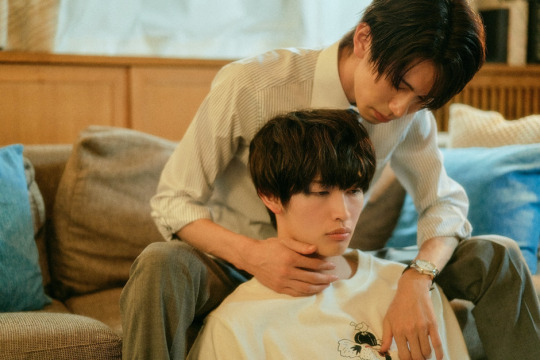
In Japanese, one cannot utter a sentence without communicating at least two things: (1) the actual content of the message itself, the referential meaning; and (2) a metamessage about the relationship between the speaker and the listener, an indexical meaning. A striking feature about Japanese is that it is the latter message that most often assumes greater importance.
From: Creating an Ideal Self: Theories of Selfhood and Pedagogy at a Japanese Ethics Retreat by Dorinne K. Kondo
Every sentence that Segasaki and Yoh say to each other carries 2 meanings - the one we read in the subtitles, and too often, the one that never travels across the screen. The "miscommunication" that many perceive to be happening isn't always just about "using actions vs words" (though there is much to be said about that too) - the words are being used, but it's hard to hear them when said words are in Japanese and packed with information English is simply not designed to carry.
So, with 6 episodes of corrections made and nuances explained, it's finally time to get back to actually talking about how all of this adds to our understanding of the characters and of their relationship. In these 6 episodes, both Segasaki and Yoh have run the entire gamut of speech levels - but where Segasaki shifts consistently and with purpose, Yoh tends to shift as a reflexive, or reactionary response.
Or, what Segasaki choosing to shift up a speech level means to Yoh, and what Yoh's inconsistent shifts tells Segasaki (and us), about his emotional state. I'm kinda sorta not really sorry about this but ah, it's maybe possibly probably even longer than usual??
Quick Recap of Part 1:
We established two key aspects of their relationship:
1) They both acknowledge the power differential between them - Segasaki, by using "rougher" speech patterns, and Yoh, by tending to stick to the more polite end of the scale. 2) They both consider themselves to be from the same "in-group" - Both of them default to informal speech patterns when speaking to each other (even Yoh, despite being the junior/lower on the social hierarchy)
And now on to Part 2!
Changes in Emotion: Yoh
Yoh tends to experience his emotions rather intensely, and through his monologues we understand that he isn't always able to process these emotions immediately. As such, the shifts in his speech levels tend to happen subconsciously - there isn't an immediately obvious, predictable pattern to those shifts, because they are simply a reflection of how he's feeling in the moment.

Y: あ、いや。なんでもない…です* Y: Ah, iya, nandemonai…desu* Y: Ah, no, it's….nothing* The shift to polite form, and the awkward manner in which he does it, reflects Yoh's growing insecurity (See EP 2 for other examples).
From the moment Segasaki starts returning home late, Yoh becomes more and more unsure of where he stands with Segasaki, and this growing emotional distance is conveyed through his speech patterns becoming (awkardly) more polite than in Ep 1. He speaks hesitantly and indirectly, until he gets drunk (and even then, his insecurity still shows in how he barely switches down to rough speech during their not-argument).
In Ep 3, we again see Yoh shifting up to polite forms often, except this time, the shifts show his gratitude as well as sincerity.

Because of how ridiculously expensive the pork bun is, Yoh expresses his thanks by saying the full ありがとうございます (arigatou gozaimasu) here as opposed to just "arigatou" or other more casual forms. In return, Segasaki acknowledges the formality Yoh pays him with a nod (and a mouthful of pork bun).
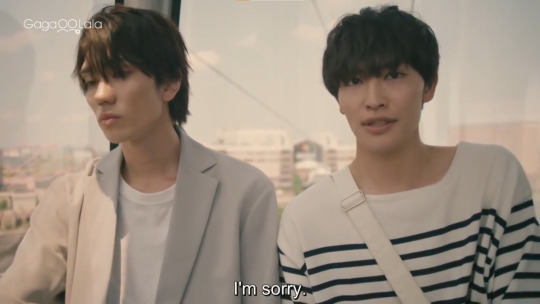
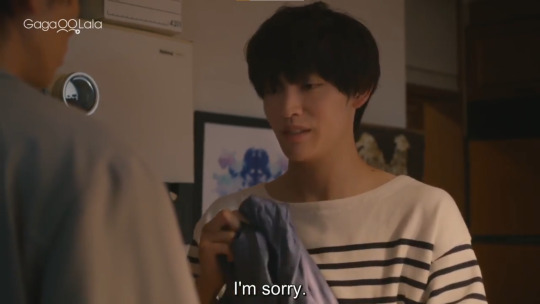
Y: すいません Y: suimasen Y: I'm sorry This is the more formal version of "I'm sorry" (textbook pronunciation is sumimasen, but textbooks are for nerds Yoh's version is very common as well and still polite)
In both these scenes, Yoh switches to suimasen as opposed to his usual, and more casual, ごめん / ごめんなさい (gomen/gomen nasai), that he also uses in this episode. As previously mentioned, "sorry" in Japanese can also be used to mean "thank you". Here Yoh is doing both - apologizing for Segasaki having to "go the extra mile" to take care of him (ie, he feels he has imposed upon Segasaki - a fear he has mentioned a few times), and at the same time also expressing his gratitude for being taken care of. However, it's the shift up to the polite version that conveys his sincerity, and carries the extra message that - despite his regret at imposing on Segasaki - Yoh still values these moments and feels touched by them.
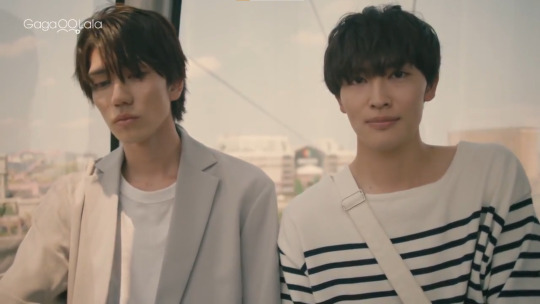
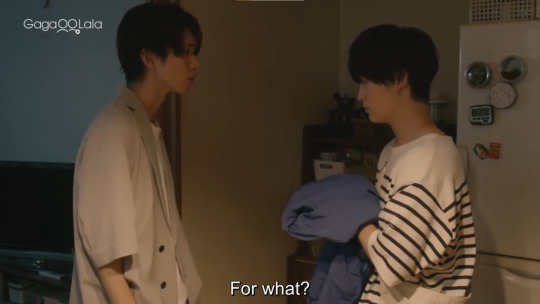
Both times, you see Segasaki taking note of this, albeit slightly confused, and probably a little shy too (Segasaki is after all, very good at picking up on social cues - especially Yoh's - and spends the whole of Ep 3 doing just that).

Y: 漫画が とてもだめです Y: manga ga totemo dame desu Y: (My) manga is... really bad.
Yoh spends most of Ep 5 safely ensconced in the informal speech level, switching up only twice - the above scene, and later when he attributes his recovery to Segasaki's care as a way of thanks. The switch in the bathroom is sudden, and adds a sense of certainty to his statement that reflects the intensity of the despair he feels (even though he comes across as more kicked puppy than anything). The formality is also a way to "distance" himself from the reality of it, because it does hurt to acknowledge this.
All of these instances show us that Yoh's shifts up in speech levels tend to reflect when he's feeling vulnerable in some way - when he's insecure, dejected or hurt, or when he feels that he has imposed upon Segasaki.
So then, does Yoh also shift down?

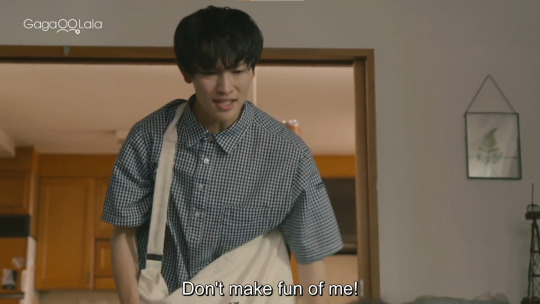
Well, yes and no.
Left (Ep 4): Y: ふざけんな [very rude] Y: Fuzakenna Y: The hell are you doing! Right (Ep 5): Y: バカにすんなよ![slurred vowels] Y: baka ni sun na yo Y: Don't look down on me!
Even if we include (just barely) the non-argument of Ep 2, there honestly aren't many scenarios in which Yoh shifts down to a "rougher" speech pattern - and he never drops as low as Segasaki does. This has to do with both his acknowledgement of the power differential that exists between Segasaki and him, as well as his less assertive nature. In fact, even when speaking to Man-san, with whom he shares his thoughts more freely, Yoh remains casual, but not rough. (Man-san is waaaay rougher than Yoh, tbh). Hence, when Yoh does shift down, it tends to be explosive and short lived, just like his frustration or anger.
So why "yes and no"? Because being lower in the social hierarchy also introduces another, more interesting way to express yourself - by choosing not to switch up.
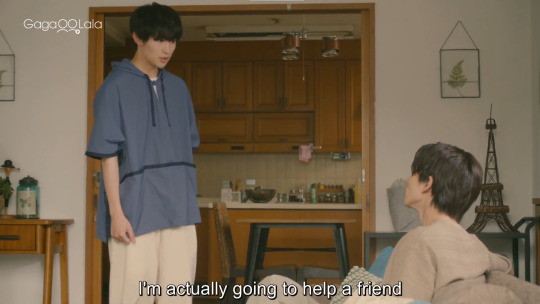

We see this in Ep 5, when Yoh tries to lie about going to Man-san's place. He sticks to his baseline informal speech when he announces this, whereas he previously used polite speech in Ep 4. Is it possible that Yoh was simply overcompensating and trying too hard to sound casual to hide his lie in Ep 5? Yes. But before coming to that conclusion, there is another important detail to note - that instances like this, where Yoh doesn't switch up, have gradually been increasing as the show progresses.
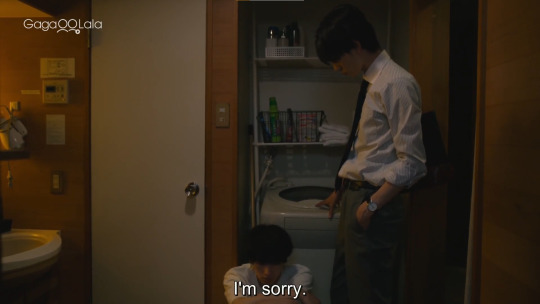

In Ep 5 and 6, Yoh uses the slightly less formal gomen nasai to apologize (contrast this with Ep 2's suimasen mentioned earlier). Given that Yoh himself mentions in Ep 5 that he thought Segasaki would be angry, and in Ep 6 clearly underscores his apology with a proper bow (yes, there are standards to how you should bow in Japan) - you would think that these 2 situations would be the perfect time to switch back up again. So why? Once again, the key to unlocking the metamessage is the wider context; i.e., we need to consider what Segasaki has been doing. please indulge my desire to sound cool and mysterious despite already announcing it in the title
Establishing Roles: Segasaki
In direct contrast to Yoh, Segasaki is very consistent with his speech shifts, and a clear pattern emerges. First off - when Segasaki is angry with Yoh, he drops straight down.
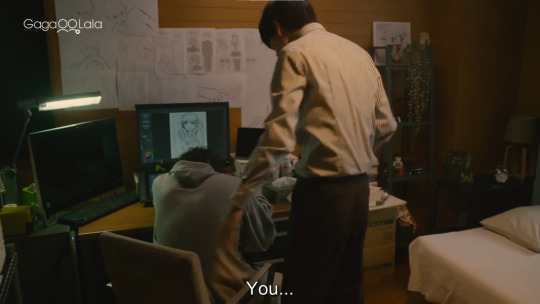
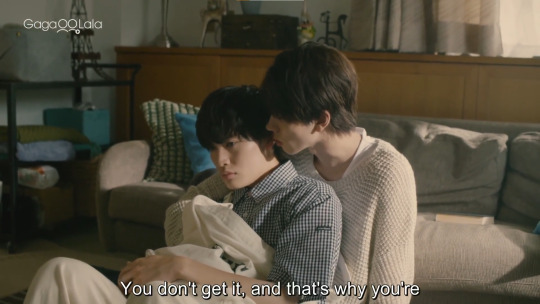
Left (Ep 2): S: てめぇ [very, very rude] S: temee S: You Right (Ep 5): S: 分かってねぇだろ 分かってねぇから 泊りで仕事とか言い出すんだろうが [slurred Rs, word contraction, slurred vowels] S: wakattenee daro wakattenee kara tomari de shigoto toka ii dasun darou ga S: You don't do you? You don't understand and that's why you can just say things like you'll stay out to work overnight.
Like, waaaaaaaay down. The argument in Ep 5 is the most obvious example of this, but using "temee" to address someone like he does in Ep 2 is very very rude and, together with the "haaah?!" Segasaki says before this line, also does a lot to convey that he is Not Happy.
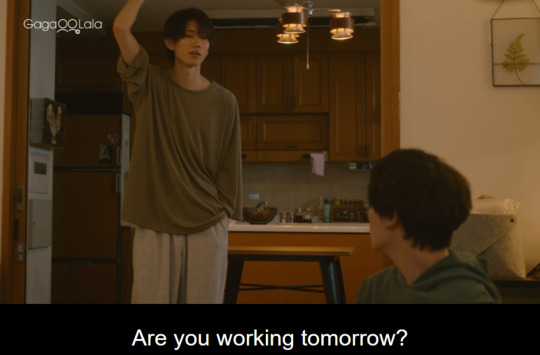
S: 明日は仕事すんのか [word contraction] S: ashita wa shigoto sun no ka S: すんのかしないのか、どっちだよ [word contraction, informal, assertive end particle] S: sun no ka shinai no ka, docchi da yo S: Are you working tomorrow? S: Working or not, which is it?
The lines in this interaction from Ep 3 aren't really rude per se - certainly not compared to temee - but they are rougher than his usual and very direct. We've seen Segasaki do this multiple times throughout the episodes - dropping his levels when he's being assertive, and it is in response to that assertiveness, that Yoh gives the following reply:

Y: いや、ないです [plain forms, but with the addition of desu form] Y: Iya, nai desu Y: No, I don't [have anything planned]
Mixing plain forms with -desu at the end makes Yoh's reply a little more formal, and is another way in which Yoh acknowledges the power differential between them. Being higher in the social hierarchy means Segasaki enjoys a greater sense of linguistic freedom, and shifts down in speech level are therefore unsurprising, and indeed, expected.
So, if there is no real need for Segasaki to shift up, then, what does it mean when he chooses to do so?
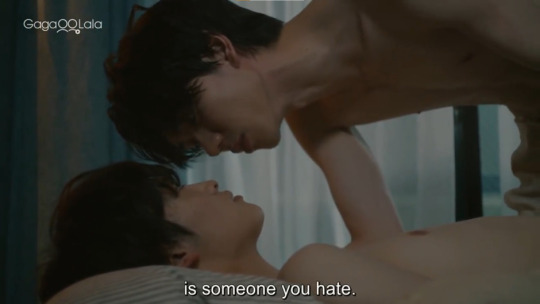

Left: S: まあ 残念ながら 相手は大嫌いな俺ですけど S: Maa... zennen nagara aite wa daikirai na ore desukedo S: Well, unfortunately, your partner is me - who you hate so much Right: S: 好きにさせてもらうけど...な ? S: suki ni sasete morau kedo... na? S: I'll gratefully do as I please...yea?
After an entire episode of using Yoh's own words to tease him as a way to try and get Yoh to face his own feelings, Segasaki lands his sharpest and strongest push of the day in these 2 scenes not by reinforcing the hierarchy between them, but by subverting it. Shifting up to a more formal speech level when he doesn't have to, particularly in the second scene where he uses deferential word forms, creates the illusion of elevating Yoh in the hierarchy, which is then immediately undermined by the irreverent tone in which Segasaki says them.
In other words, Segasaki only shifts up as a power play.
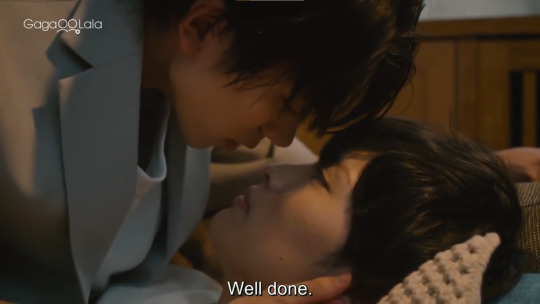

S: よくできました S: yoku dekimashita
We first see Segasaki use this formal way of saying "well done" at the end of Ep 3 and again in Ep 4, and it brings to mind the literal stamp of approval that teachers often give to students in school. Here, there is no teasing or subversion of the hierarchy going on. Segasaki is establishing his role in Yoh's life - to provide and care for him - through the use of polite speech, and reinforcing the power differential between them in the most straightforward way possible.
This use of polite speech allows the speaker to indirectly index their social identity - often as one who is in charge or responsible. Within the Japanese household, it also happens when a role/obligation (often parental) is being carried out - eg , a parent might switch to polite speech to indicate their role as provider when asking the rest of the family "What would you like to eat?". Similarly, we again see Segasaki underscore his role in the following:

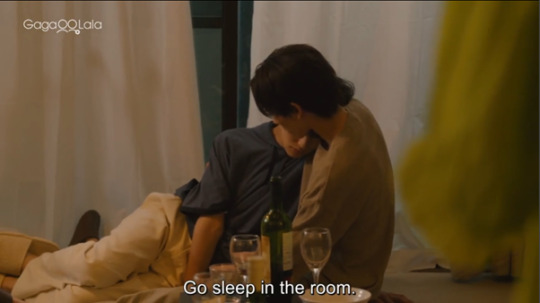
Left (Ep 5) S: ごちそうさまでした S: Gochisousama deshita S: Thank you for the food Right (Ep 4) S: 寝るなら部屋いきな* S: neru nara heya ikina S: If you're going to sleep, then go to the room alright?
In Ep 5, Segasaki leads the saying of this standard phrase, customarily said at the end of a meal to express gratitude to everything that made the meal possible. It is the use of the full, more formal version (as opposed to just gochisousama) that indexes his role as Yoh's caregiver when he leads in saying this, and indeed he spends most of Ep 5 enjoying that role. In Ep 4, although he does not quite use the -masu form here, the imperative form "ikina" brings to mind a parent trying to coax their child to bed, the same way Segasaki is doing to a very drunk and sleepy Yoh.
This is the key we were looking for - with every episode, Segasaki consistently reinforces his role in Yoh's life, the same way he consistently responds to and encourages Yoh's amae. And with every episode, Yoh becomes a little more confident of his place with Segasaki, a little more willing to believe that maybe Segasaki might really return his feelings. It's easy to look at Yoh in Ep 2, see him push Segasaki away, and think that the same Yoh appears in Ep 5, but that couldn't be further from the truth. Because in Ep 2, a drunk Yoh barely drops to rough speech, whereas in Ep 5, a sober Yoh feels safe enough to even "curse" a little (well, as far as cursing goes in Japan at least, which admittedly is not far). In both word and action, they have both grown, and have both contributed to the strengthening of their relationship.
So! In conclusion (omg we made it to the end) we have established that:
Segasaki has a clear, predictable pattern in his shifts - he switches up to formal when establishing or reinforcing his role in Yoh's life, but when he's serious, or angry with Yoh, he drops all the way down.
Yoh is less consistent, because his shifts tend to be more subconscious and reflective of his emotional state. He's more inclined to switch up when he's in a vulnerable state, eg, feeling insecure or dejected, or when he wants to express his sincerity in apologizing or showing gratitude. When he's nervous, or in response to Segasaki either being direct with him or upset with him, he'll sort of switch up too (ie, he'll mix polite forms with informal forms, or he'll try to say things in an indirect way).
Through the use of speech level shifts, both Segasaki and Yoh indirectly reinforce and acknowledge their individual roles in each other's life, and by observing the changes in these shifts over time, we the audience are able to track the progression of their relationship as well.
In the next part, we'll look at the differences in the way they speak to others versus between themselves - looking specifically at examples from Ep 4, 6 and 7.
As always, thank you for reading, and feel free to ask any questions! (*ˊᗜˋ*)/
#my personal weatherman#taikan yohou#体感予報#segasaki x yoh#sociolinguistics#japanese language#MPW language analysis#mytranslations#MPW subtitle corrections#this post assumes you have read part 1 of the language analysis#who says MPW is over#it's not over i don't believe it#also this was so long#was it too confusing? should I be less nerdy?#ep 7's corrections will come out next#tumblr's formatting sucks but reddit sucks more lol#i still enjoy writing these posts though#i hope it gives everyone an excuse to rewatch MPW again
141 notes
·
View notes